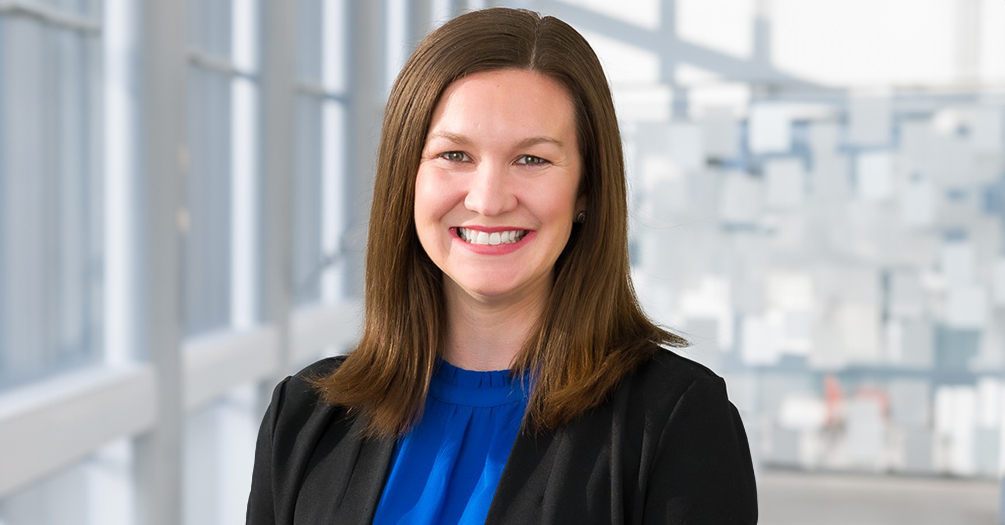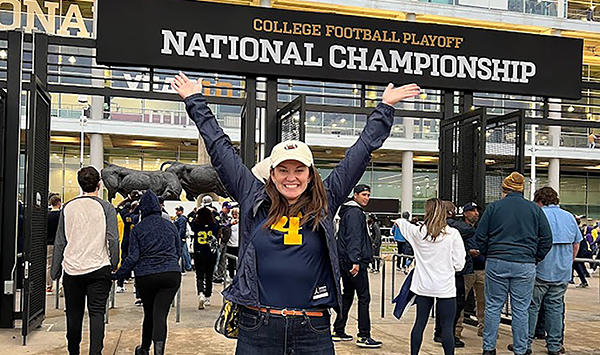Alumna launches Genetic Counseling Training Program in Texas

Samantha Greenberg, MPH ’16
Health Behavior and Health Education
Samantha Greenberg, MPH ’16, works in a realm surrounded by big terms and complex strings of words that accompany some of the most concerning maladies in the disease spectrum: von Hippel-Lindau syndrome, paraganglioma/pheochromocytoma and pathogenic germline DNA.
But when Greenberg looks at her role as an assistant professor, researcher and the architect of the new Genetic Counseling Training Program at the University of Texas Southwestern Medical Center in Dallas, she finds it best defined in a monosyllabic manner.
Help.
“It all goes back to the idea, how do we best help people?” said Greenberg, who earned a Master of Public Health in Health Behavior and Health Education from the University of Michigan School of Public Health.
She has spent the past year and a half preparing for the first cohort of students who will take the program on its inaugural run. Greenberg admits to being “challenged in every way” when building such a complex program from the ground up, but that goal of assisting those who might best benefit from genetic counseling is the fuel in the engine that drives her.
At Michigan, I was able to combine public health with genetic counseling, and I think that created opportunities that are not available to many.”
“Every day, I wake up and think about why we do this,” she said. “The goal is to develop forward-thinking genetic counselors who are ready to advance health equity wherever they go after training. Every day is a great opportunity to make a difference and leverage our community in a way that advances medicine as a whole. I feel very lucky to wake up each day and be doing this.”
The path to building the genetics counseling program in Texas has been a circuitous one for the Midland, Michigan, native, who initially thought she would attend college outside of her home state.
After visiting the Ann Arbor campus, however, things changed for Greenberg, who was influenced by an oddity called “the sweatshirt factor.”
“A Campus Day leader mentioned that when you are on the Michigan campus, you don’t see students wearing sweatshirts from other schools—it’s all Michigan,” she said. “That energy was infectious, so I decided this is what I was looking for.”
Once enrolled, Greenberg was all-in, soon working with Campus Day, orientation, and becoming an Honors resident advisor, while doing social neuroendocrinology research.
The pre-med major had long been told she should be a physician, possibly a pediatrician, since she had a great rapport with kids and was strong in the sciences. But an encounter with Wendy R. Uhlmann, clinical professor in the Department of Human Genetics at Michigan Medicine and the director of the University of Michigan Medical Genetics Clinic, thrust open an opportunity to specialize in an area Greenberg previously had not considered.

“I had been debating if pre-med was right for me, and although I really didn’t know where I wanted to be, I just knew I wanted to be in healthcare, helping people,” Greenberg said. “Wendy talked about the complex genetics concepts that we navigate with our patients, and how not only is the patient our patient, but their family is also our patient.”
Not ready to dive right into graduate school after receiving her bachelor’s degree in Neuroscience from the College of Literature, Sciences, and the Arts, Greenberg took some time off to educate others, teaching science to about 170 seventh-grade students in Tulsa, Oklahoma, with Teach for America.
There, observations of her students proved somewhat prophetic. They told her, “Ms. Greenberg, you should be a doctor,” one day during the genetics and human body unit. For Greenberg, that moment confirmed she needed to return to graduate school and pursue genetic counseling.
However, her time with students highlighted the need to improve access to healthcare and genetic services.
She would go on to earn a master’s degree in Genetic Counseling from the University of Michigan’s Rackham Graduate School and her MPH from Michigan Public Health, both in 2016.
Greenberg then moved to Salt Lake City to start her career at Huntsman Cancer Institute while serving on the faculty in the University of Utah Graduate Program in Genetic Counseling, where she taught cancer genetics courses, directed clinical fieldwork rotations and chaired research for genetic counseling graduate students. There, she also recently completed her PhD in Nursing at the University of Utah.
When the opportunity to craft the new UT Southwestern Medical Center Genetic Counseling Program in Texas arrived, it was a portal Greenberg felt compelled to enter.
“At Michigan, I was able to combine public health with genetic counseling, and I think that created opportunities that are not available to many,” said Greenberg, who is an assistant professor in Health Care Sciences in the School of Health Professions at UT Southwestern.
“It all lined up. I am a big believer in everything happening for a reason. I never planned to move to Dallas; I never planned to start a program. But here I am, working to fix my niche of the world as best I can.”
I’ve become someone who enjoys and is pretty good at bringing people together, and that skill is what I bring to the table to improve access for patients and their families.”
Her past clinical and research work has focused primarily on increasing access and measuring outcomes for patients with prostate cancer and paraganglioma while providing clinical care for a wide range of indications. She also facilitates the organization of multidisciplinary teams and genetics clinics for patients, and now trainees. She said genetic counseling can help patients understand the importance of personal and family history, especially with certain cancers, and she wants to see that service available to all.
“It has been an evolution for me,” Greenberg said. “We have an incredible amount of available genetics information, so not serving people with that information is truly a disservice. I’ve become someone who enjoys and is pretty good at bringing people together, and that skill is what I bring to the table to improve access for patients and their families.”
She said there are thousands of people in the United States who have a hereditary cancer syndrome, but less than half of them have been diagnosed or received any genetic counseling. She wants to see more work and collaboration across the country to utilize genetics research and data to reach as many as possible.
“It all goes back to that same foundation,” Greenberg said, “with each person using their individual skills to figure out how we can best help people.”
